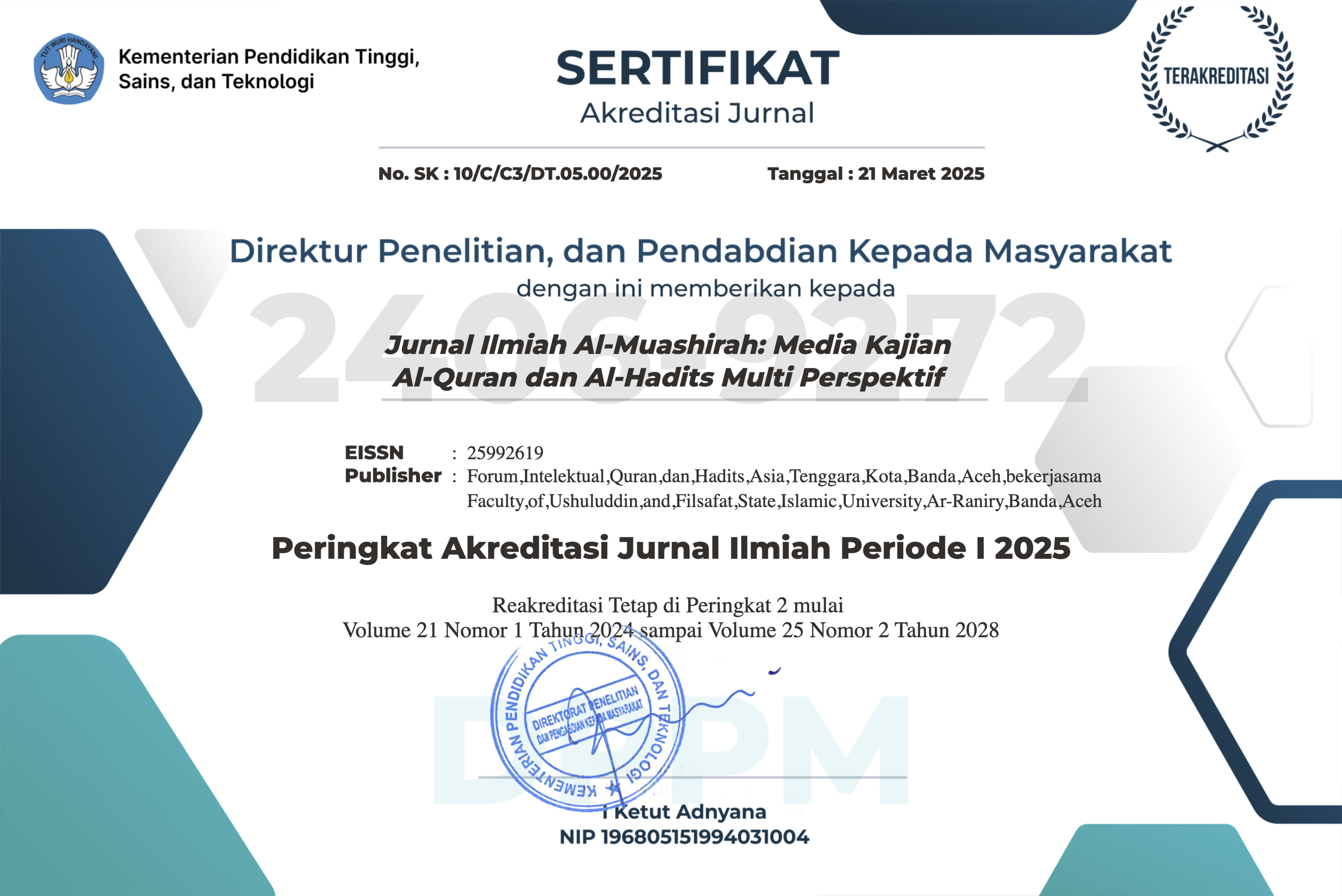Politics and Ideology in Qur’anic Translation: A Comparative Analysis Between the Indonesian Ministry of Religious Affairs Translation and the Hilali-Khan Translation
DOI:
https://doi.org/10.22373/jim.v22i1.29862Keywords:
Hilali-Khan Translation, Kemenag Translation, Politics and Ideology, Qur'anic Translation.Abstract
This study explores the ideological and cultural influences on the interpretation of Qur'anic verses through a comparative analysis of the Ministry of Religious Affairs (Kemenag) translation from Indonesia and the translation by Muhammad Taqi al-Din al-Hilali and Muhammad Muhsin Khan from Saudi Arabia. Focusing on theological, political, and gender themes, this study examines key verses addressing concepts such as tauhid (the oneness of God), awliyā’ (relations between Muslims and non-Muslims), and gender roles. The Kemenag translation reflects Indonesia's pluralistic and inclusive policies, promoting interfaith harmony, mutual respect, and gender equality. On the other hand, the Hilali-Khan translation adheres to a literal framework influenced by Wahhabi ideology, emphasizing theological exclusivity and traditional gender hierarchies. These differences highlight the impact of socio-political contexts on Qur'anic translation strategies and their implications for societal perceptions and theological discourse. Through a comparative textual and discourse analysis approach, this study demonstrates that inclusive and context-aware translations contribute to promoting justice, tolerance, and social cohesion. The findings underscore the need to balance theological fidelity with socio-political responsiveness to serve diverse Muslim societies.Downloads
References
Abdelaal, Noureldin Mohamed, and Sabariah Md Rashid, ‘Semantic Loss in the Holy Qur’an Translation With Special Reference to Surah Al-W a QiAAa (Chapter of The Event Inevitable )’, Sage Open, 5.4 (2015), doi:10.1177/2158244015605880
Abdelkarim, Majda Babiker Ahmed, and Ali Albashir Mohammed Alhaj, ‘A Study of the Translatability and Untranslatability of Qur’ānic Arabic Particle Laʿalla لَعَلَّ in Some Selected Surahs: A Linguistic Perspective’, Journal of Language Teaching and Research, 15.2 (2024), pp. 579–87, doi:10.17507/jltr.1502.26
Abdussalam, Aam, Tedi Supriyadi, Udin Supriadi, Aep Saepudin, and Muhamad Imam Pamungkas, ‘Exegetical Translation of the Qur’an: An Action Research on Prospective Islamic Teachers in Indonesia’, Indonesian Journal of Applied Linguistics, 11.2 (2021), pp. 254–68
Abrorov, Ilyes Mukhrimhonovich, Siumbel Usmanovna Sabitova, Alfiya Marselevna Khabibullina, and Mohamed Magdy Yassin, ‘Tafsir Application in the Customs and Rules and Social Behavior of the Various Society’, International Journal of Criminology and Sociology, 9 (2022), pp. 2427–33, doi:10.6000/1929-4409.2020.09.294
al-Suyūṭī, Abī al-Faḍl Jalāl al-Dīn ʻAbd al-Raḥmān Abī Bakr, Lubab Al Nuqul Fi Asbab Al Nuzul (muassasah al kitab al thaqafiyah, 2022)
Al-tarawneh, Alalddin, ‘A HEBREW-SKOPOS APPROACH TO TRANSLATING MUQA ÙÙ A ‘ Ó T IN THE QUR ’ Ó NIC OATHS’, XLIII.1, pp. 29–51 <https://hamdardislamicus.com.pk/index.php/hi/article/download/35/51>
Al-Tarawneh, Alalddin, ‘The Role of Quran Translations in Radicalizing Muslims in the West and Misrepresenting Islam’, Journal of Religion and Violence, 9.1 (2021), pp. 101–22
Arifin, Zainal, and Lailatu Rohmah, ‘THE CONCEPT OF LEADERSHIP OF THE TRANSNATIONAL ISLAMIC IDEOLOGY PERSPECTIVE AND RESPONSES TO DEMOCRACY PRACTICES IN INDONESIA’, Akademika : Jurnal Pemikiran Islam, 24.1 (2019), pp. 213–32, doi:10.32332/akademika.v24i1.1474
Van Dijk, Teun A, ‘Ideology: A Multidisciplinary Approach’, 1998
Fairclough, Norman, Critical Discourse Analysis: The Critical Study of Language (Routledge, 2013)
Faizin, Hamam, ‘TOWARDS A GENDER-SENSITIVE TRANSLATION OF THE QURʾĀN THE CASE OF THE MOST RECENT REVISION OF AL-QUR’ĀN DAN TERJEMAHNYA’
Al Farisi, Mohamad Zaka, ‘Acceptability of the Quran Translation’, Al-Jami’ah: Journal of Islamic Studies, 61.2 (2023), pp. 329–63, doi:10.14421/ajis.2023.612.329-363
Hilali, Khan, Translation of the Meaning of the Noble Qur’an into the English Language (Maktaburrais, 1404)
Hummadi, Ali Salman, Seriaznita Binti Mat Said, Rafi’ M Hussein, Ahmed Abdulateef Sabti, and Huda Abed Ali Hattab, ‘Rhetorical Loss in Translating Prepositional Phrases of the Holy Qur’an’, Sage Open, 10.1 (2020), doi:10.1177/2158244020902094
Ibn Kathīr, ʻImād al-Dīn Abī al-Fidāʼ Ismāʻīl, Tafsīr Al-Qur’ān Al-Adzīm (Dar al-Fikr, 2011)
KEMENAG, Al Qur’an Dan Terjemahannya, JK (Lajnah Pentashihan Mushaf al Qur’an Badan Litbang dan Diklat Kemenag, 2019)
Lukman, Fadhli, ‘Against the “Control Argument”: Assessing the State’s Authority in the State-Commissioned Qur’ān Translation’, Islamic Studies Review, 2.1 (2023), pp. 1–24
———, ‘Conflicting Interests in the Creation of a State-Authorised Translation: Comparing the Saudi and Indonesian Editions of Al-Qur’an Dan Terjemahnya’, Journal of Qur’anic Studies, 26.1 (2024), pp. 38–62, doi:10.3366/jqs.2024.0568
Mahasneh, Anjad A, ‘The Translation of Jihad Verses After the Emergence of ISIS: Distortion or Reality’, Academic Journal of Interdisciplinary Studies, 10.5 (2021), p. 129, doi:10.36941/ajis-2021-0128
Mitchell, Paul, Halim Rane, and Adis Duderija, ‘Views on Political Islam among Australian Converts to Islam: Findings of a National Survey’, Politics and Religion, 16.3 (2023), pp. 492–515, doi:10.1017/S1755048323000135
Mohammad, Ali Albashir, ‘Cultural and Stylistic Losses and Gains Faced in Translating the Qur’anic Arabic Words Known as Kur’hun كُرْه into English: A Comparative Study’, International Journal of Religion, 5.3 (2024), pp. 519–32, doi:10.61707/sx9kzx85
Mohammed Abdul-Ghafour, Abdul-Qader Khaleel, Norsimah Mat Awal, Intan Safinaz Zainudin, and Ashinida Aladdin, ‘Meanings of Near-Synonyms and Their Translation Issues in the Holy Qur’ān’, GEMA Online®Journal of Language Studies, 17.4 (2017), pp. 258–73, doi:10.17576/gema-2017-1704-17
Muhammad Irsad, Abdul Mustaqim, and Saifuddin Zuhri Qudsy, ‘Paradigm Shifts in Gender Narratives of Tafsīr Al-Ibrīz through Oral Exegesis on Youtube’, Jurnal Studi Ilmu-Ilmu Al-Qur’an Dan Hadis, 25.1 (2024), pp. 141–60, doi:10.14421/qh.v25i1.5416
Mustafa, Burçin K, ‘Ambiguity, Ideology, and Doctrine Propagation in Qur’an Translation’, Journal of Qur’anic Studies, 21.1 (2019), pp. 21–49
Nirwana, Andri, Sufian Suri, Didi Junaedi, Sayed Akhyar, Faisal Husen Ismail, Fuad Fansuri, and others, ‘Exploration of Wasatiyah Diction to Realize Sustainable Tolerance Between Religious Communities: A Study of the Translation of the Quran of the Ministry of Religious Affairs of the Republic of Indonesia’, Revista de Gestão Social e Ambiental, 18.6 (2024), p. e05717, doi:10.24857/rgsa.v18n6-012
Nurbayan, Yayan, ‘Metaphors in the Quran and Its Translation Accuracy in Indonesian’, Indonesian Journal of Applied Linguistics, 8.3 (2019), p. 710, doi:10.17509/ijal.v8i3.15550
Obeidat, Adham, and Tengku Sepora Binti Mahadi, ‘The English Translation of Idiomatic Collocations in The Noble Quran: Problem and Solutions’, Issues in Language Studies, 9.2 (2020), pp. 78–93, doi:10.33736/ils.2246.2020
Rumman, Ronza N Abu, and Mohd Nour Al Salem, ‘The Translation of Quranic Metaphorical Expressions From Arabic Into English’, Journal of Language Teaching and Research, 14.3 (2023), pp. 646–55, doi:10.17507/jltr.1403.12
Sadiqi, Rostam, ‘Sequential and Recursive Structure Searching Algorithms for Arabic and English Texts’, 8.1.1 (2020), pp. 62–67, doi:10.30534/ijeter/2020/0981.12020
Saputra, Kurniawan Dwi, and Septiana Dwiputri Maharani, ‘Makna Peran Manusia Sebagai Khalifah Dan Paradigma Teosentrisme Dalam Etika Lingkungan Islam’, Kalimah: Jurnal Studi Agama Dan Pemikiran Islam, 21.1 (2024), pp. 1–24, doi:10.21111/klm.v21i1.9118
Sibgatullina, Gulnaz, and Gerard Wiegers, eds., European Muslims and the Qur’an (De Gruyter, 2023), doi:10.1515/9783111140797
Spier, Troy E, ‘Extremist Propaganda and Qur’anic Scripture: A “radical’’ Corpus-Based Study of the Dabiq”’, Discourse & Society, 29.5 (2018), pp. 553–67, doi:10.1177/0957926518770265
Yakubovych, Mykhaylo, The Kingdom and the Qur’an: Translating the Holy Book of Islam in Saudi Arabia (Open Book Publishers, 2024)
———, ‘The Kingdom and the Qur’An’, 2024, doi:10.11647/obp.0381
Downloads
Published
Issue
Section
License
Authors who publish in Jurnal Ilmiah Al-Mu'ashirah agree to the following terms:
- Authors retain copyright and grant the journal right of first publication with the work simultaneously licensed under a Attribution-ShareAlike 4.0 International (CC BY-SA 4.0) License that allows others to share the work with an acknowledgment of the work's authorship and initial publication in this journal.
- Authors are able to enter into separate, additional contractual arrangements for the non-exclusive distribution of the journal's published version of the work (e.g., post it to an institutional repository or publish it in a book), with an acknowledgment of its initial publication in this journal.
- Authors are permitted and encouraged to post their work online (e.g., in institutional repositories or on their website) prior to and during the submission process, as it can lead to productive exchanges, as well as earlier and greater citation of published work (See The Effect of Open Access).














